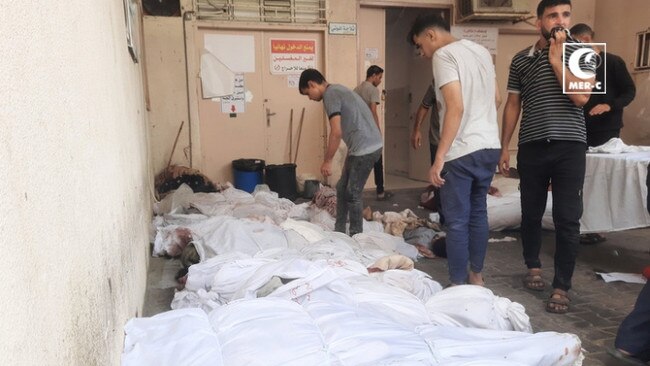Gaza’s Indonesian hospital a ‘revolving door’ of grief
The Indonesian Hospital is running out of fuel and medicines as it struggles to deal with escalating casualties.

Every night shrouded bodies are lined up outside the Indonesian-funded hospital in northern Gaza, the second largest in the war-torn strip. Each morning grieving families come to collect their dead.
The 235-bed hospital, now on the front lines of a war with Israel just 2km away, has become a revolving door of grief.
“In the morning, bodies are collected, and by night, it is filled with those who passed away during the day,” Fikri Rofiu Haq, a volunteer in Gaza with Indonesia’s Medical Emergency Rescue Committee that built and funds the hospital, told the Weekend Australian.
“Today, dozens of bodies once again filled the morgue of the Indonesian hospital, placed on the sidewalk in front of the morgue. They are waiting for morning to be taken by their families for burial.
“This is the situation at the Indonesian hospital every day during this conflict.”
The 24-year-old university student is distraught at the civilian casualties though seemingly unaware of the civilian massacre across the border with Israel that sparked the latest crisis.
“Hamas fighters have never intentionally targeted civilians because they launch their missiles at Israeli military locations,” he says when asked — reflecting the extent of Gaza’s isolation.
“This is different from the Israeli military which has been clearly targeting refugee camps throughout Gaza, public facilities, and even the Al-Mahdi Al-Ahli Arab Baptist Hospital.”
Since Gaza’s largest hospital was hit last month by a rocket that both sides have accused the other of responsibility for, the Indonesian clinic has taken a greater share of casualties _ including hundreds of dead and wounded from Israeli strikes this week on a nearby market and the Jabalia refugee camp.
The Hamas-run health ministry in Gaza says more than 9000 people have been killed _ 3,600 of them children _ in Israeli retaliatory strikes since 1400 Israelis were killed in the October 7 Hamas terror attacks.
The Indonesian hospital alone has recorded more than 1200 deaths since the start of the conflict, and treated some 3500 wounded.
But it is now facing a “fuel and medication crisis”, says Fikri with only enough electricity to power its first floor emergency ward and only hours worth of fuel left for its one operating generator.
Patients are going without beds and medicines, and some doctors are working in corridors by torch light.
The Indonesian government has dispatched emergency and medical aid which it hopes to get through the Rafah crossing and into Gaza this weekend via the Egyptian Red Crescent.
But there is no guarantee and more than 2000 Gazans, mostly families of inpatients, are now sheltering at the hospital, where some ceilings have collapsed and windows shattered by the force of nearby air strikes.
On Wednesday, hospital director Athef Kahloet urged Jakarta to pressure the US and European governments to help “stop the war and ensure the security of aid and essential supplies entering Gaza”.
He called for a guarantee that the hospital would not be “threatened or bombed”, and for direly-needed medicines and other medical equipment.
Until those supplies come, it is Fikri’s job _ one of three remaining Indonesian volunteers _ to help source what food and medicines he can from the few shops that remain open in Northern Gaza, a partially-levelled “ghost town”.
They have been venturing out in a hospital ambulance, hoping it will provide some protection, but there have been some close calls and he’s not sure how many more times they can take such risks.



To join the conversation, please log in. Don't have an account? Register
Join the conversation, you are commenting as Logout